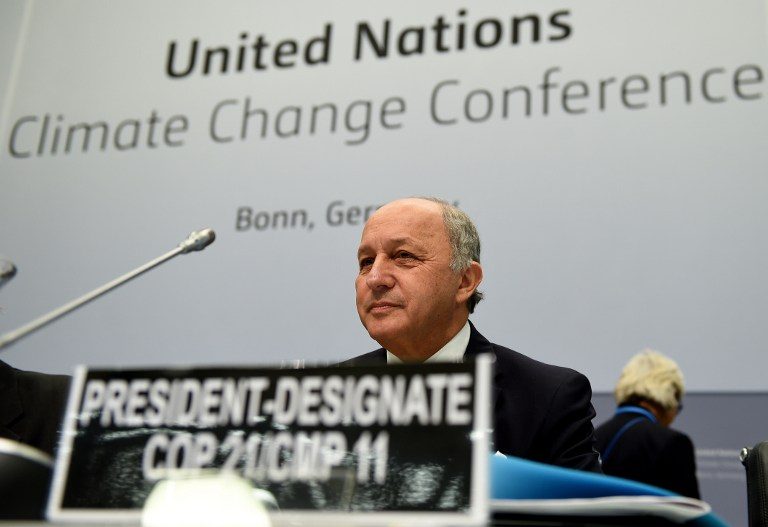SUMMARY
This is AI generated summarization, which may have errors. For context, always refer to the full article.

BONN, Germany (UPDATED) – France sought Monday, June 1, to breathe life into talks for a UN climate pact, urging countries to forge a “pre-agreement” weeks before they meet to seal the deal in December.
French Foreign Minister Laurent Fabius warned against temptations to leave a breakthrough for the very end, a problem that has bedeviled climate negotiations for over two decades.
“The goal is for us to reach a pre-agreement as early as October,” said Fabius, who will steer the vital November 30-December 11 parlay in Paris.
This would enable the Paris conference “to add the finishing touches and focus on the contentious points,” Fabius said at the start of a fresh round of negotiations in Bonn.
Seeking momentum, the minister said he would host two rounds of ministerial meetings in Paris, on July 20-21 and on September 7. He did not say who would attend.
“These consultations should allow us (politicians) to make progress on the more delicate questions to facilitate your work,” Fabius told negotiators.
The Paris conference seeks to crown a 6-year wrangle in the 195-nation UN Framework Convention on Climate Change (UNFCCC) with a post-2020 pact on curbing greenhouse gases.
The goal is to limit global warming to no more than 2ºC (3.6ºF) over pre-industrial levels.
The agreement should also muster financial help for poor countries threatened by worsening drought, flood and rising seas.
There will be two more UNFCCC negotiating rounds in September and October.
But the process is scarred by memories of the last time the UN tried to forge a global climate deal – the deadlocked 2009 summit in Copenhagen.
French Ecology Minister Segolene Royal on Monday attacked the negotiations’ snail-like pace and labyrinthine ways.
“The UN negotiations are totally unsuited to the climate emergency,” Royal told the daily Le Monde.
“Everyone says so in private, everyone is totally aware of it, but the sheer weight of the process is such that it just carries on as usual.”
The 11-day Bonn talks will seek to ease the way by trimming a sprawling draft text.
It is currently an 80-page compendium of national viewpoints, many of which overlap while others directly oppose one another.
Nations remain deeply divided on how to measure the adequacy of national goals, and how to periodically ramp up action.
Developing economies also insist that rich countries show how they will keep a promise of mustering $100 billion (92 billion euros) a year in climate finance by 2020.
On current emissions trends, say scientists, the planet could be on track for 4.8 C of warming this century alone.
So far, 38 UN parties have made pledges to a roster of emissions curbs at the heart of the envisioned Paris pact.
They include the United States, the European Union (EU), Russia and Canada, but not Japan, Australia, Brazil, India or China, the world’s number one emitter.
‘Step change’
“We are not on a trajectory to 2ºC,” France’s climate negotiator Laurence Tubiana said Monday of the early pledges.
Europe called for “a step change”, with EU delegation head Elina Bardram urging countries to list their pledges soon.
“Submissions currently made only cover about 30 percent of the global emissions,” she told reporters in Bonn.
“By the time we meet in Paris we will need a clear idea of where we stand in terms of an aggregate effort toward the two degrees.”
Meanwhile, 6 European energy majors – BG Group, BP, Eni, Shell, Statoil and Total – issued a call for carbon pricing and transparent, reliable policies to underpin it.
“Carbon pricing will discourage high carbon options and reduce uncertainty that will help stimulate investments in the right low-carbon technologies,” they said in a letter to the UNFCCC and France.
Carbon pricing can take various forms, including a tax on carbon pollution or a requirement to buy emissions permits – imposing a cost on fossil fuels to encourage energy efficiency and a switch to cleaner sources.
Proponents say it is an essential tool in the emissions-fighting kit, but it has met with resistance from industry and consumers, and – as in the case of Europe’s permit system – organizational problems. – Celine Serrat, AFP / Rappler.co
Add a comment
How does this make you feel?
There are no comments yet. Add your comment to start the conversation.